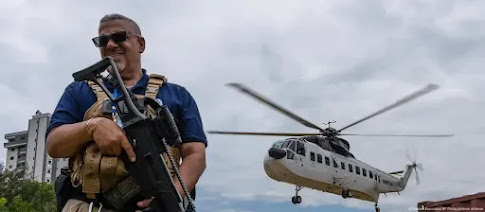Haiti has been wracked by unrest since 2021. But a wave of gang violence in recent weeks, including an incident where a UN helicopter was shot at, has raised concerns about the situation in the country.
The Associated Press and other US media outlets said the helicopter carrying three crew members and 15 passengers landed safely in the capital.
UN helicopters are key for delivering food and other aid to millions of Haitians in communities cut off from roads and places ruled by armed gangs.
There was no official confirmation about the attack that targeted the helicopter, which belonged to the UN's World Food Program.
The swell of violence has sparked concerns that armed gangs are trying to exert their influence even more.
What is the situation in Haiti?
Haiti has been wracked by armed gangs since the death of President Jovenel Moise in 2021. Much of Port-au-Prince and its suburbs have since come under the control of various armed groups that have banded together under a common alliance called Viv Ansanm.
Earlier in the month, armed gangs opened fire in a town some 60 miles (97 kilometers) north of the capital, setting dozens of houses on fire.
At least 70 people were killed, including three children.
In the last week alone, more than 10,000 people were internally displaced, according to the UN migration agency.
The agency had said at the start of September that more than 700,000 people were internally displaced across the Caribbean nation, nearly double the figure six months earlier.
What is the international community doing to help?
Haiti's current government has little power and relies on a UN-backed multinational security mission to combat gangs.
The security support mission has some 400 police officers on the ground. Their task is to assist the Haitian national police force.
The force is expected to grow to 2,500. Kenya said earlier in the week during a UN Security Council briefing that it was going to strengthen the security mission by another 600 officers by mid-November.
However, the gangs are extremely well armed, largely because of gun trafficking from the US, a point that US lawmakers raised in a letter to the Biden administration.
rm/zc (Reuters, AP, AFP)
MOLEGHAF: Armed Attacks in Port-au-Prince
On October 20th, 2024, the National Movement for Liberty and Equality of Haitians for Fraternity (Mouvement National pour la Liberté et L’égalité des Haïtiens pour la Fraternité, MOLEGHAF), a member organization of the Black Alliance for Peace (BAP), issued a statement on the increasing violence perpetrated by the paramilitary group “Viv Ansanm” (or “Live Together”) in Solino, Fò Nasyonal, Nazon, Kriswa and other nearby popular neighborhoods in Port-au-Prince.
MOLEGHAF asserts that this escalation in paramilitary violence is rooted in the neocolonial Haitian state’s collaboration with the United States and other colonial powers, all working to maintain their criminal political agenda and keep Haiti under occupation:
“The sellout Haitian bourgeoisie, at the service of U.S. imperialism, controls our country. This is Full Spectrum Dominance. The ruling class seeks to break the back of all forms of Haitian resistance. By burning our neighborhoods down, they exterminate our very ability to resist. While the United Nations is allegedly sanctioning and embargoing weapons and bullets, the murderous group “LIVE TOGETHER” magically has access to hundreds of thousands of U.S. weapons.”
MOLEGHAF stresses that “US and Western imperialism” have targeted their neighborhoods since “at least our national uprising in 2021.” The attacks on their communities continue “even though hundreds of Kenyan troops now occupy us”. As the Haitian elite uses paramilitaries to crush popular Haitian resistance, MOLEGHAF describes the deteriorating situation:
“None of us are free to leave our homes. We don’t know which way to go. The bloodthirsty death squads kill the poor and unfortunate inside their shacks. They burn through homes and memories. We, the population of Solino, have resisted this barbarism for 1 year and 7 months. Stand with us, We need help! The neocolonial Haitian state lays the basis of these massacres. We cannot continue in this situation. Solidarity is our only hope.”
The Black Alliance for Peace calls on the masses, especially those within the heart of the empire, to stand in solidarity with MOLEGHAF. We reiterate that if there is no peace, justice, and popular sovereignty for the Haitian masses, there can be no Zone of Peace in the Americas. We support MOLEGHAF’s efforts to provide the correct, radical analysis of its current predicament: that the ruling classes in Haiti, under the supervision of Western imperialists, “are seeking to break the back of the popular social movements.” We say NO to US-sponsored violence and repression in Haiti and YES to self-determination and freedom!!
Until the last rock is thrown
Until the last poem is written
Until the last voudou is sung
MOLEGHAF will resist alongside the heroic Haitian people!

No comments:
Post a Comment